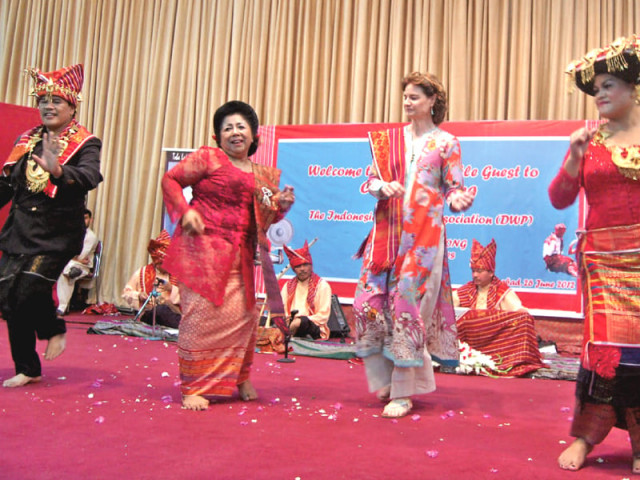Building bridges: Indonesian artists perform traditional songs, dances at coffee morning
A morning filled with music has the guests singing along.

The Indonesian Women Association (IWA) held a coffee morning on Tuesday, featuring “Perkolong-Kolong” a musical tradition, to celebrate 65 years of diplomatic relations between Pakistan and Indonesia.
IWA Chairperson Butar Latuconsina, the Indonesian envoy’s wife, dressed in a traditional red dress called “kabaya”, enthusiastically hosted a morning filled with festivity at her residence.
Perkolong-Kolong originated in North Sumatra which is one of the 33 provinces of Indonesia and more specifically from Tanah Karo or Karoland. Speaking to The Express Tribune, Latuconsina said she is from Tanah Karo herself.
A number of the hosts were dressed in their traditional dress made from linen, silk and net. Though the language barrier was a slight hurdle, the overwhelming hospitality and friendliness of the Indonesian hosts made the morning enjoyable for all. Latuconsina entertained the guests by singing on stage and dancing, inviting the ladies to join in which they did.
Performers Arnis Ginting (keyboard), Dengki Sembiring (flute), Endy Sitepu (‘gendang indong’ drums), Ali Tarigan (gong), Agustina Sembiring (female singer/dancer) and Mulianta Karo-Karo (male singer/dancer) were more than happy to entertain the guests. “I loved singing ‘Jeevay Jeevay Pakistan’ the most and I was thrilled that everyone was clapping and singing along,” said Sembiring.
They started with the ‘Lau Bulhaam’ dance which is a tribute to the long river in Tanah Karo with the same name. The song deals with the Indonesians’ nostalgia for their homeland when they have to go abroad for education or employment. The melancholic song was off-set by Mulyanta’s upbeat rendition of “Goroon ki na kaalon ki”, a light-hearted Pakistani song. Mulyanta not only mimicked the Urdu words but also incorporated some subtle ‘bhangra’ moves to go with the song.
The Indonesian saruni is very similar to the sarangi used in classical music in the sub-continent. Writer Rubina Qazilbash said, “Art and music are the only mediums which are pure and can convey love and unity despite language barriers.”
Published In The Express Tribune, June 27th, 2012.



















COMMENTS
Comments are moderated and generally will be posted if they are on-topic and not abusive.
For more information, please see our Comments FAQ